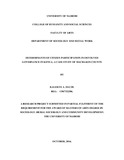| dc.description.abstract | Devolution is mainly associated with decentralization of power and sharing national resources among county. Despite the centrality of public participation in ensuring good governance, studies reveal that there is an information gap on the devolved structures and what constitutes devolution in the Kenyan context. This study therefore seeks to assess the determinants of citizen participation in devolved governance in the Country. The study was guided by the following specific objectives: to establish the nature of citizen participation in devolved governance, to find out institutional factors influencing citizen participation in devolved governance, to determine individual factors influencing their participation in devolved governance and the socio-cultural factors influencing their participation in devolved governance.
The study adopted the use of exploratory research design. The target population for the study was members of the public (18 years and above), members of the County assembly and ministers in County Government. Stratified sampling technique was used to group the population into constituencies. Purposive sampling was used to sample the participants for the study. This study was carried out in seven constituencies where one was used for piloting. A total of 182 respondents were targeted by the study (constituting 168 members of the public, 8 MCAs and 6 ministers) out of which 107 responded (members of the public, 6 MCAs and 5 ministers) giving a response rate of 64%.
Data collection was done through Key Informant Interview schedules for MCAs and Ministers and Focus group discussions for members of the public. The interview information was analyzed in a systematic whereby the author established patterns, trends and relationships in the information gathered and came to useful conclusions and recommendations,. The study found that members of the public in Machakos County participate in County governance in the following ways: attending development meetings, consultative forums and. The study also found that institutional factors such as outdated structures, poor security, corruption, tribalism and nepotism, lacking formal procedures to host public views and lack of proper channels for feedback. The individual related factors such as poverty, lack of time and interest, ignorance and lack of confidence on the county leadership hinder their participation in governance. Socio-cultural factors such as: poor distribution of resources, poverty, illiteracy and age barriers influence the participation of the public in public governance.
The study recommended that more awareness be created among the members of the public. This will encourage their participation in governance as they will know the importance of participation and ways by which they can participate. The study finally recommended that another study be done to assess the challenges facing the County government in involving members of the public in governance which was not the concern of this study. | en_US |



